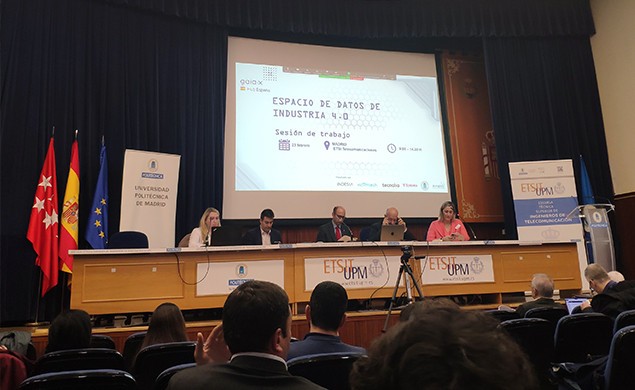GMV Participates in the Industry 4.0 Working Group for the “Spanish Gaia‑X Hub” Data Space

The concept of a data space can be defined as a decentralized (federated) infrastructure that can be used in data ecosystems for reliable data sharing and exchange, as a way to improve interoperability by applying a combination of governmental, organizational, legal, and technical mechanisms. For example, as part of the AgrarIA project, we are working on developing and implementing a data space for the agriculture industry. The aim is to produce a single platform that can combine a variety of cross-cutting technologies, which can in turn be put to a variety of uses across the food and agriculture value chains. These data spaces will allow for voluntary sharing of data, under a system of common governance and security mechanisms, as a way to help transform those industries in a way that can serve as a reference point for many others.
The “Spanish Gaia‑X Hub” has been created in this context in collaboration with Spain’s State Secretariat of Artificial Intelligence and various other public and private actors, and it includes a variety of industry-related data spaces such as those for Industry 4.0, Mobility, and Health.
On February 23rd, a working session was held for the Industry 4.0 working group for the Spanish Gaia‑X Hub data space, and it included participation by Angel Vicente Vázquez, GMV’s Big Data Architect. The aim of this event was to advance implementation of a reliable ecosystem for data sharing in industry. During this gathering, experts worked in teams to identify cross-cutting case studies related to sharing and application of data in various industries, especially those that could qualify for funding under component 12 of Spain’s 2030 Recovery, Transformation, and Resilience Plan, on “Industrial Policy”. The goal of events like these is to create a community that revolves around data, to encourage innovation and economic growth in the industrial sector, as a way of producing benefits for society as a whole.
The meeting began with an opening address by Alberto Palomo-Lozano, the Spanish government’s Chief Data Officer and chair of the Gaia‑X governmental council. He presented an introduction to data spaces and explained the interest that has already developed in Europe with regard to this subject. Among other objectives, Europe’s current data strategy represents an effort to drive the regional economy by creating a single European data market, with data flowing among the various Member States and sectors of economic activity, all in accordance with the European values of self‑determination, privacy, transparency, security, and fair competition. As part of that strategy, the European Commission has already announced its interest in investing in and developing common data spaces in strategic economic sectors, as well as in the public interest. It is putting a special emphasis on those related to manufacturing, sustainable energy, mobility, health, financial services, energy, agriculture, public administration, and qualifications. Once developed, it is expected that those spaces will become interconnected, so that the data housed in them can be applied in a cross-cutting manner.
As conclusions drawn from the work performed by the teams during the work sessions, a series of use cases applicable to the industrial sector were identified and selected: characterization of the reliability of products/components, intelligent forecasting of demand, intelligent reuse and recycling, a platform for sharing requirements for assets and problems detected, a platform for real-time supply chain visibility, etc.
As an example, the AgrarIA project is working on creating a single platform that can combine a variety of cross-cutting technologies, such as multispectral analysis, management of images, and the Internet of things, along with a set of basic artificial intelligence technologies: machine learning, intelligent forecasting systems, pattern analysis, etc. With all of this, the aim is to perform research on the possibility of creating a platform focused on data governance and interoperability, which will allow automated modeling for various use cases pertaining to the food and agriculture value chain. One example of this would be intelligent management of demand, in a way that would allow future sales figures to be predicted, and therefore the amount of stock needed to supply that demand. It is hoped that the results will provide a vision of what the food and agriculture industries will look like in the near future, becoming much more productive and sustainable, while also making use of other related technologies such as bioengineering and robotics.
AgrarIA is funded by Spain’s Ministry of Economic Affairs and Digital Transformation, through the R&D Missions in Artificial Intelligence Program of the State Secretariat for Digitalization and Artificial Intelligence (SEDIA) (file no. MIA.2021.M01.0004), using funds from the country’s Recovery, Resilience, and Transformation Plan.
